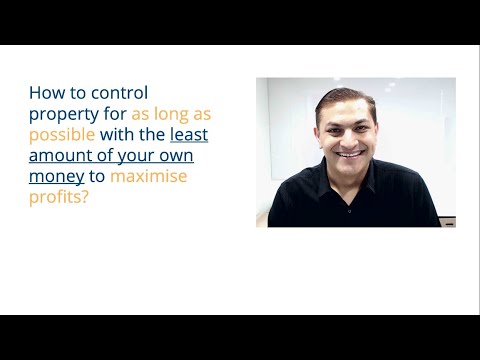Property Options: Your Definitive Guide
Property Options or Real Estate Options is one of the common Site Acquisition strategies. And in recent times it has been marketed as a be-all and end-all strategy by property gurus. I know this because when I started out, I myself spent $6000 for a weekend of taurus excretus on property options. Trust me when I tell you that a property option is nothing more than an agreement between a buyer and a seller of land.
And just like any other agreement, a property options agreement can be negotiated to include terms and conditions that both parties can agree on. I have personally signed options agreements without paying an options fee and these property options agreements are no longer than 3-4 pages, basically outlining the rights and obligations of the buyer as well as the seller packaged into a property option agreement.
And in this Property Options Guide, I will bust all the property option myths that are circulating in online property forums, magazines and seminars. I won’t be surprised if you have already come across a property options course or seminar being marketed as this secret way to control property without using your own money that only the billionaires and multi millionaires know about.
Property Options have been around for many years and are used primarily as an acquisition strategy, only where both the seller and the buyer can agree on terms.
This last line is important, because no land owner these days is dumb enough that they are sitting ducks waiting for you to get an option on their property.
What are Property Options? Or
What Is a Property Option?
A property option or a real estate option is a legal agreement or contract between the potential buyer i.e. holder of the options contract aka optionee, and the seller or vendor who grants the option aka optionor.
In simple terms, a real estate option or a property option is an agreement between...
Buyer: Optionee & Seller: Optionor
In a property options agreement, the seller grants to the buyer the exclusive and irrevocable right to purchase a property they own for a specified amount (property value) during a specified time horizon / period and under specific terms, conditions and obligations.
You are missing out if you haven't yet subscribed to our YouTube Channel
Property Options Agreement Vs Contract Of Sale Agreement
What makes a property options agreement different from a normal contract of sale agreement is that it can be negotiated in favour of the buyer or optionee to give them the right to purchase the property without an obligation to purchase.
When negotiated correctly to the buyer's advantage, the beauty of a property option lies in the buyer (optionee) being able to lock in a property value in future for a specific time period (option term).
And then be able to control the property to add value to the property by way of permitting or development approval and then on sell it or assign the option to someone else without having to settle on the property. And do all this while being able to legally pull out of the options contract or deal without repercussions during the option term.
Contract Of Sales are different because they go unconditional after a period of time and there is no way to pull out of the contract once they are unconditional.
3 Components of A property options contract
- Option Fee / Premium - Fees in exchange for time & control.
- Option Term - the time period during which the option can be exercised.
- Property Value - The negotiated value of the property when the option is exercised.
Benefits Of Property Options
Property Options are a great way to gain control of the property and profit from that property without using significant capital of your own.
It minimises risk because it gives the buyer an out or a get out of jail free card if the buyer chooses to as well as create a huge leverage for them.
This massive leverage can enable a buyer to have multiple property option deals simultaneously with the same amount of money.
Types Of Property Options
Property Options give the buyer control of the property in exchange for an option fee to achieve certain objectives in a specified period of time.
Put Options
If you are the buyer or optionee, this is the type of option you need to be wary of. And if you are the seller or optionor you would want to make sure that you have the put option. Hence the need to arrive at a negotiated sweet spot in terms of option fee, time horizon and property value for the options agreement.
Put options put the control back in the seller’s hand and give them the right, but not the obligation, to force the buyer or optionee to purchase the property at a set price, within a specified time period and under specific terms and conditions.
Put options are better known as a financial market derivative, however, they are not very common in a real estate transaction.
Call Options
Call Options on the other give the buyer the right, but not the obligation, to purchase the optioned property at a set price, within a specified time period under specific terms and conditions.
For a property developer looking to flip, develop or control a property for profit and on-sell it without actually closing the sale or settling on the property, call options must be part of their arsenal.
Call options are designed to advantage the buyer rather than the seller. Therefore, having negotiation & entrepreneurial skills to convince the seller to sign a call option on their property is an invaluable skill and starts with identifying the needs of the seller.
Property Option Scenario
Imagine yourself in their shoes... you as a real estate developer are looking to secure an option on their property. You have identified that you can add value to their property by changing the zoning or getting a permit that maximises their properties potential value.
You have figured out that it will cost X but once you have the permit or development approval and you can on-sell it for X+50%. You need 12 months to get the site permitted and sold. So you need to convince the seller to give you a property option on their site for you to be able to get the permit & on-sell it before the option expires.
What’s in it for you - the buyer (optionee)?
This negotiation could take many forms and could include offering the seller an above market price in exchange for time, or sharing a percentage of the profit, or sharing a fixed amount of profit you make.
By entering into a call option you the developer in effect take control of the property without having to own it. The seller on the other hand will continue to live in it if that’s the case and will have to continue to pay rates, property taxes, maintenance costs and their current mortgage if there is one.
All you have done is risked a small option fee to control the property for a period of time and you will on-sell the property at a profit before the option expires.
What’s in it for the Seller - the optionor?
From the seller perspective, this can be lucrative if they do not have the money, means or knowledge to do what you are doing i.e. adding value to their site themselves. They get an upfront fee which can prove to be a cash injection for them to pay down an existing debt or to go on a holiday, whatever their need may be at the time.
Power Of Leverage
The leverage power of a call option can be huge. For a small option premium, the developer can potentially control a property worth thousands or millions of dollars.
A smart developer can control and profit from millions of dollars worth of property with a minimum upfront outlay and without ever purchasing them with their downside risk limited to the amount spent on adding value to the site + the options fee.
Put and Call Options In Conjunction
Put and Call options when used in conjunction give the seller the right, but not the obligation, to sell and the Buyer the right, but not the obligation, to buy the property.
A put and call option is generally structured such that the buyer's option term expires before the seller's option period. If the buyer fails to exercise their call option to purchase then the seller still has time to exercise their put option to sell. This has the effect of the seller forcing the buyer to buy.
Hence my reason to caution you as a property developer to not sign a put option unless you are 100% sure that you can and or don’t mind settling on the property, if required.
Common Property Option Types & Negotiated Terms:
As I mentioned earlier a property option is an agreement between a buyer and seller and a property options agreement can be negotiated to include terms and conditions that both parties can agree on, which presents a multitude of options that can be drafted into an options agreement.
Purchase Option
An option followed by a contract of sale, which does give the buyer the right to settle / close the sale at the end of the option period or not. The buyer can use the option agreement to delay the settlement.
Buy Back Option
Apart from using a put option, the seller can also haven an option to buy back the option at an agreed property value.
Listing Option
The buyer could get a listing option so they can on-sell the site with or without adding value at a higher price.
Management Option
The buyer or seller could negotiate a management option which would give them an option to purchase in a management agreement and or claim the management rights of the property.
One of my fellow developer friends recently negotiated the management rights for 65 self service apartments from another developer.
Payment Plan Option
You can negotiate an instalment plan with the seller to pay off the property in monthly or annual payments over a period of time.
Shared Capital Gains Option
Where both parties can share the uplift in value based on negotiations.
Access to Assets
Access to soil, rock, timber or chattels during the options period. If the seller does not live on the site, the buyer can negotiate to excavate & sell rock on site during the option period.
As long as the property developer can negotiate with the seller, they can have various terms in the options agreement to suit them whether to fund the project or add value to the site.
Lease Options
Lease options are similar to “rent to buy” agreements. A Lease option can be put in place when a property option agreement is combined with a rental lease agreement. This enables the option holder to not only control the property for a specified period before purchasing it but to also occupy it under the terms of the lease.
Lease Options are common with rehabilitation entrepreneurs. Lease Options enable them to first lease the property and over a period of time they can slowly refurbish the property while living in the property. Once they are finished with the rehabilitation and their option period is coming to an end, they can simply sell the property and move on.
What’s In A Property Options Agreement?
I cannot reveal the intricate details of my property options agreement, but I am including some excerpts from one of my property options agreement that you can reference as a property options contract template. All property options agreement clauses been converted to text for easy reading.
A property options contract template would include the following…
Party Details
Details of both parties, their individual names or the names of the entities that are entering into the agreement.
Options Premium Or Options Fee
In the Options Fee clause example below, I only paid $1 as the option premium for a $5m property.

Security For The Property Developer

Sellers / Owners Obligations
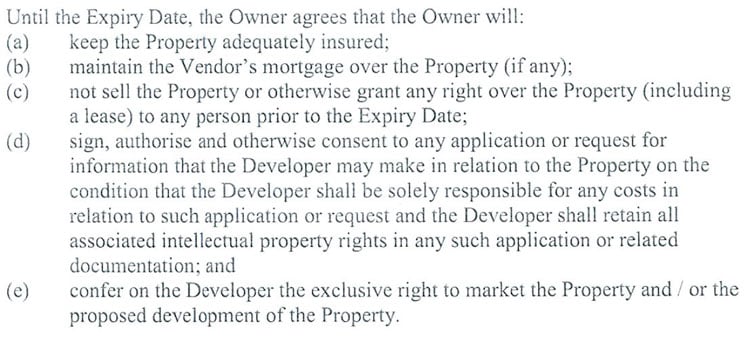
Exercising The Option

Extra Security For The Developer
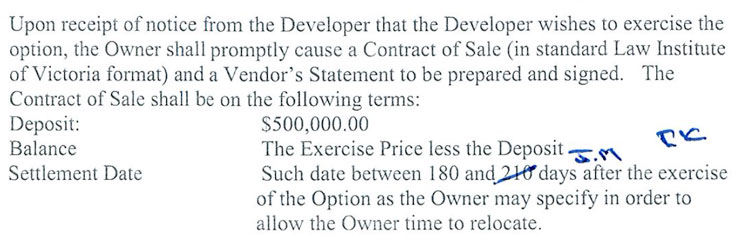
Sale shall be on the following terms:
Deposit: $500,000.00
Option To On-Sell The Property Option
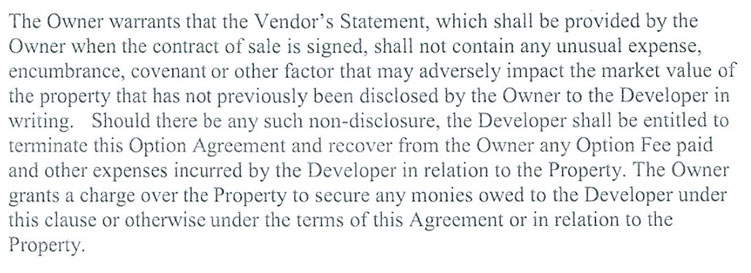
Nominating Property Option Beneficiary

Owner / Seller Selling The Property To Third Party

Binding Property Option

Obligation To Facilitate

Confidentiality Clause

To Each Their Own

Option For The Seller To Partake In Development

If The Developer Does Not Exercise The Option

Developers Obligations

Governing Law

Get The Edge Now!
Discover the transformative power of our FREE EDGE platform and
unlock a world of opportunities at no cost!
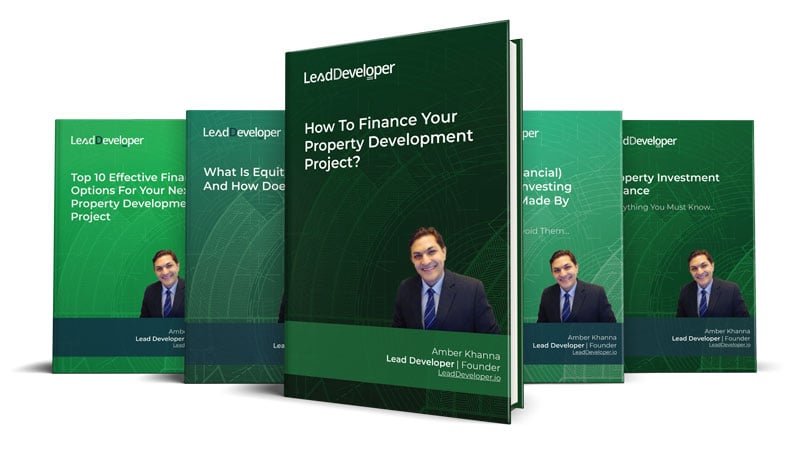
Your Real Estate Toolkit Awaits!
Free eBooks, Courses & Feasibility Suite Trial—Join Today!
✓ Unlimited FREE Trial: Experience the full power of our Feasibility Suite with hands-on demos
—explore without limits, no time pressure & without commitment or credit card!
✓ Learn from Success: Dive into real-life case studies for practical insights.
✓ Engage, Inquire, and Innovate: Ask questions, request features, and engage in lively discussions.
✓ Showcase Your Projects and Gain Insights: Share your projects and get personalised feedback.
✓ Free Resources Galore: Access a treasure trove of free resources,
eBooks & courses to keep you informed.
✓ Exclusive Training: Enjoy members-only training to sharpen your skills.
Property Option Secrets
There are 2 property option secrets to making sure that you are successful at securing a property option.
property Options Secret # 1
Never Involve A Real Estate Agent When Negotiating Property Options
Why? Because the inherent nature of property options is that the seller gets an option fee in exchange for time.
A real estate agent on the other hand would usually get a commission when the property is sold, so it’s never a good outcome for them if instead of a sale, an options agreement is negotiated between the seller and the buyer. Because this delays their pay day. So if you have a real estate agent involved in the deal, they would do everything in their power to make sure that an options agreement is never negotiated. So to begin with you are already fighting external forces.
Don’t get me wrong, there are always real estate agents that know you and if you have bought from them before, they would rather bring the project to their regular buyer than to go through the full marketing campaign.
If they can quickly offload a site, they would be happy to bring the site to you, provided you are not a tyre kicker. However, you will need to sweeten the deal for them and find a way to remunerate them even if an option is being signed.
However, if a real estate agent is not involved, it usually means that the site you are after is not on the market or is not yet listed. Which brings us to the second property options secret.
Property Options Secret # 2
Sourcing Off Market Sites
Source Off Market Sites For Real Estate Development i.e. sites that are not yet listed and are not on the market. This helps in 3 ways:
- You do not have competition i.e. you are probably the only one talking to the seller / vendor.
- You are not fighting external forces like real estate agents.
- And finally, it works best because the seller and vendor knows comparatively less about their site than they would if the site was on the market.
Here are 3 ways to Source Off Market Sites For Your Next Property Development Project
Door Knocking
There are three ways to source off-market sites. The number one way is if you go door knocking, and a lot of places do not allow door knocking to be able to find out whether or not that site’s available.
Letter Drop
An alternative to door knocking is that you can do a letter drop. You can send in a letter, asking people if they want to sell, what price they would want to sell, and so on.
Secret Agents
The second way of getting an off-market site is if you’ve got some sort of a rapport with an agent that you work with. The only way that can happen is if you are concentrating on an area, and you spend time to build a rapport with your local agent. Quite often, they will come up with a site that they haven’t even listed as yet on the market.
That way, you can actually talk to them and say, “Look. If you find something like that, bring it to me.” They can then help you get a site that’s actually not listed, which basically means you’re cutting the competition out, and you’re getting in there before somebody else gets there.
Network
Have you got a network? How do you get a network? Well you’ve got to be in the industry. You have to go to different networking events. Networking takes a little longer but you have to start. I myself started out by sending out letters. I had three people call me. One of them couldn’t pay the mortgage, so he just wanted to sell his house.
Property Options Alternative
With More Or Less The Same Result, Without A Property Option
The Longer Settlement
If getting a property option is off the table, here is what you can do to still maximise your profits.
First things first, as a seasoned property investor / developer, you want to make sure that you control the property as long as possible with the least amount of your own money as possible. And the best part is that anyone can do this and anyone can learn this. And the coolest thing is that you get to maximise your upside and minimise your investment at the same time.
Property Development Timeline

This is a 36-month project timeline. Here's how you would go about your entire development process. Now, this timeline's only used as an example based on averages for a standard townhouse development. The timelines can vary for every project, but all I wanna do here is show you the best way, but make sure you watch 'til the end because there's a twist.
Contract Of Sale | Settlement
Let's say you signed the contract of sale in month one, and you are required to settle or forfeit your contract in three months time. You then start adding value by preparing your town planning application for obtaining a permit, which takes about three months from settlement.
Town Planning
Once the town application is lodged at the end of six months, the counsel then takes approximately nine months to process their application. Before granting you a permit, also known as DA or development approval.
Land Value Uplift
Now let's say when you bought the site as is without a permit, your land value was sitting where you see the green line. However, now that you have added values through the land, post-permit or post-DA, you've bought an uplift in your land value. Your next phase is getting your town planning drawings endorsed.
Endorsed Drawings
Drawing endorsement is basically reflecting all the town planning conditions that came with your permit on your town planning drawings, and getting them stand-by counsel.
Marketing And Pre-Sales
Once you've got endorsed drawings, you can commence your marketing for pre-sales, organize finance and start preparing your working drawings, which again, can take up to another three months.
Building Permit
Post which, you will apply for a building permit and satisfy the building's.
Construction
Then you commence construction. For the sake of keeping things simple, I've allowed nine months for construction.
Settlement

Post-construction, you'll allow another three months for your pre-sales to settle and pay you the well-deserved profit for all the hard work you've already done. And that's' when the project is completed. But here's the thing. The moment you settle on the land, it triggers two things. Need for finance and serviceability and your need for developer's equity or cash injection, as well as the need to be able to service the monthly installments or land holding costs.
The Twist
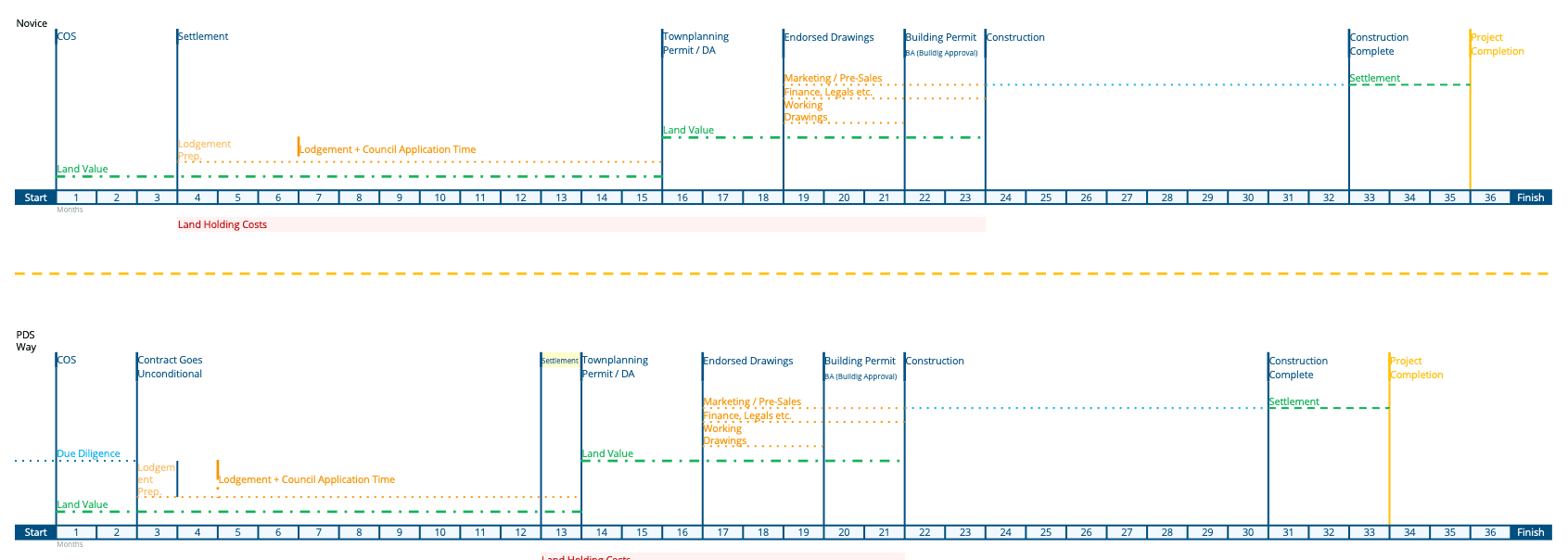
But here's the twist. Because that's not how I work, and that's certainly not how I teach my students to go about it either. Because we want to make sure that we control the property as long as possible with the least amount of your own money as possible.
By the way, if you want to learn more, simply visit pdsblueprint.com. Here's what I do with every development. I delay the settlement as far out as possible or closer to obtaining the planning permit as possible. In this example, I don't settle until I am close to getting a permit or have already obtained one.
Land Holding Costs
Let's look at both scenarios side by side. Landholding costs in my model are less than half of what you would have had to pay if you had followed the norm. Another thing that you cannot see in this model is that I don't have to inject any of my equity until later in the project. And I don't have to bear any holding costs.
MEGA DEVELOPMENT COSTS CHECKLISTS
End-To-End Property Development Cost Checklists
Includes both hard and soft costs, as well as detailed residential construction & renovation costs, so you never miss anything.
Exit Strategy
Here's another thing to know. There are two exit points for you to get out of the project should you choose to. You can exit just before settlement, or you can flip or onsell the project after adding value. That is after you've obtained the permit. Now, if you can manage to obtain the permit before you can settle on the land, bonus points to you, because all this project probably ended up costing you is the cost of getting the town planning permit. And that's how you have maximized the upside of the value of the land has now gone up.
I'm sure quite a few of you are going, "Yes, you can do this, but I can't do this." Stick with me, because I'm gonna prove you wrong. But for those who already know what they're doing or they're interested in learning more, all they have to do is go to pdsblueprint.com.
You Can Do This, But I Can't Do This
Now, for the ones who think that they can't do this, let me throw you off a bit. Now how many of you can replicate this image of Brad Pitt with a pencil and a piece of paper? I don't think many of you would say yes to that. But I'm gonna show you how to do this. And in doing so, I'll give you the skills to become a world class artist. But before I do that, how many of you think that you can replicate a solid piece of grey square? Everyone, yes? Now, if you would agree, if you can make one grey square, you can actually make two, three, nine grey squares. Correct? Yes? And you can keep making more grey squares, and more, and more, even more, and keep going, and you keep making grey squares. Keep going, and that's our end result. The truth of the matter is that if you can make one grey square, it would be very difficult to argue that you couldn't make every grey square necessary to replicate the image in its entirety.
And there you have it. Apart from teaching you about becoming a property developer, I just gave you the skills necessary to become a world class artist. In fact, even Stephen Duneier, in his TED talk, which is where I got this example from, talks about an artist by the name of Chuck Close, who is a world class artist and he creates his art using this exact same technique. The point that I'm trying to make here is that if you can take one step towards your goal, one step in front of another, you can achieve any goal. You can overcome any obstacle, and you can solve any problem. Just one step at a time, and anyone can do it.
That's the way I teach property development. Simple to learn, easy to understand, and anyone can do it. That's why I call it the property development system. So as you can tell, there are only three main things that you need to learn. You need to be able to negotiate a longer settlement, add value, and then flick or develop towards the end. Don't get overwhelmed, don't get frustrated. One grey square at a time.
If you are just starting out in Property Development, I would highly recommend that you checkout our Ultimate Guide To Getting Started In Property Development.


